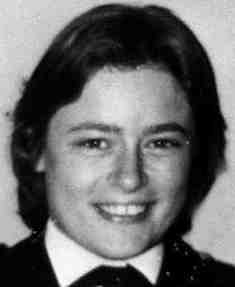Yvonne Fletcher, a 25 year-old officer with the Metropolitan Police, was shot outside the Libyan Embassy on 17 April 1984.
She had been monitoring a protest by opponents of Muammar Gaddafi in St James’ Square when a burst of automatic gunfire rang out at around 10.17am.
Ten protestors were injured and WPC Fletcher was wounded in the stomach. She died an hour and a half later in hospital at 11.50am.
It is thought the fatal 9mm bullet was fired from the first floor of the embassy.
For the next eleven days the building was besieged by armed police. The standoff only ended when the Government, fearful about reprisals against British Embassy staff in Tripoli, agreed to deport all the staff rather than arrest and prosecute any suspects.
The following week, on May 3, 1984, the Police Memorial Trust was established to honour British police officers killed in the line of duty. The Trust unveiled a memorial to Yvonne Fletcher, who had joined the Met aged 19, in St James’ Square on February 1, 1985.
It was not until 1999 that the Libyan Government accepted responsibility for the shooting and agreed to pay compensation to the policewoman’s family. However nobody has yet been convicted for the murder.
In August 2011 Yvonne’s mother Queenie Fletcher said the end of the Gadaffi regime represented “the best chance to find my daughter’s killer.”
She said in a statement: “Even after all these years, I very much hope that somebody is brought to justice. I shall be very pleased if there is a new judicial process which can find my daughter’s killer.”
On July 17, 2012, two detectives from the MPS Counter Terrorism Command travelled to Libya as part of the investigation.
On 17 April 2014 the family of Yvonne Fletcher said in a statement: “Thirty years ago today, Yvonne was shot and killed outside the Libyan People’s Bureau in St James’s Square. To many it may seem like a fading memory but to the family it is as clear as yesterday.
“We have had to move on with our lives but it is difficult to move forward when the past remains unresolved. Closure is important to the family so that we can remember Yvonne as the happy caring person she was.
“We can look back and wish things had been handled differently but here we are 30 years later, having dealt with numerous governments and a dozen or more Foreign Secretaries and it seems no closer to achieving justice for Yvonne.
“Our desire for justice is as strong as ever and we continue to support the Metropolitan Police in their ongoing investigation. The truth about what happened 30 years ago is just as important to us today as it was then.
“It is time this case was closed, 30 years of being in the news and dealing with the pressure of media attention takes its toll on all the family, more than you will ever know.”
On 19 November 2015 a man in his 50s was arrested on suspicion of conspiracy to murder in relation to the shooting.
The Metropolitan Police also issued 14 pictures of men they want to identify as part of the investigation.
A reward of £50,000 was offered for information leading to the arrest and prosecution of those responsible for the murder.
On 16 May 2017 the Crown Prosecution Service confirmed it was unable to pursue a prosecution in respect of the murder.
The Metropolitan Police said the man arrested on suspicion of conspiracy to murder had been released with no further action and added: “We believe our investigation has identified enough material to identify those responsible for WPC Fletcher’s murder if it could be presented to a court. However the key material has not been made available for use in court in evidential form for reasons of national security.
“Therefore, without this material and following a review of all the evidence that was available to prosecutors, the Crown Prosecution Service – who we worked closely with throughout – have informed us that there is insufficient admissible evidence to charge the man.
“This was an act of state-sponsored terrorism and was part of a brutal bombing and shooting campaign waged by the Gaddafi regime during the 80s and 90s, targeting Libyan dissidents in the UK and across Europe, known as the ‘stray dogs campaign’.
“The murder of WPC Fletcher resulted in a police siege at the Libyan People’s Bureau lasting 10 days, after which 30 of the occupants of the bureau were deported back to Libya and the British Government severed diplomatic relations with the Libyan regime.
“Although our investigation has always remained open, cases like this do become harder to solve over time. Our judgement is that this concludes what was by far the best opportunity to solve this tragic case and provide a degree of closure for the victims and their families.
“This investigation will never be closed but the likelihood of finding further evidence, in Libya or elsewhere, is low.”
Assistant Commissioner Mark Rowley, of the Met Police, said: “WPC Fletcher was just 25 years old when she was killed. She had joined the Met Police age 18 and I know that throughout her seven years of dedicated service she earned great respect from her colleagues and the community she served.
“The murder of a British police officer in broad daylight, outside an embassy, provoked a powerful reaction from the public and from officers at the time, and the tragedy of WPC Fletcher’s death continues to resonate with officers today.
“Every year, on the anniversary of WPC Fletcher’s death, serving and retired officers from the Met visit her memorial at St James’ Square to remember and mark their respects to a valued officer.
“I am extremely proud of the exceptional work the investigative team and the Crown Prosecution Service have carried out. I know they were incredibly determined to identify those responsible for the senseless murder of a colleague.
“I regret that we have not been able to deliver the justice that the victims and their families deserve.”
The family of WPC Yvonne Fletcher said in a statement: “We understand that some available evidence could not be used in court but are satisfied that the Metropolitan Police has left no stone unturned in its pursuit of justice in Yvonne’s case.
“The family would like to thank the Met for its continued hard work and diligence and also for always keeping us informed at every turn.
“We are deeply disappointed and frustrated that a prosecution cannot proceed at this time. We had hoped that the latest turn of events would finally lead to some closure for the family.”
On the 40th anniversary of the murder, in April 2024, the Met Police confirmed there were no active lines of enquiry but said officers would assess and investigate any relevant new information.
______
Notes and sources:
Footage of the demonstration outside the Libyan Embassy and the shooting of WPC Yvonne Fletcher on 17 April 1984 can be seen on YouTube. (Age restricted due to community guidelines).
For a fuller account of the attempts to investigate the murder, see the Wikipedia page on the case and the Daily Telegraph article Yvonne Fletcher and the Betrayal of Justice.

